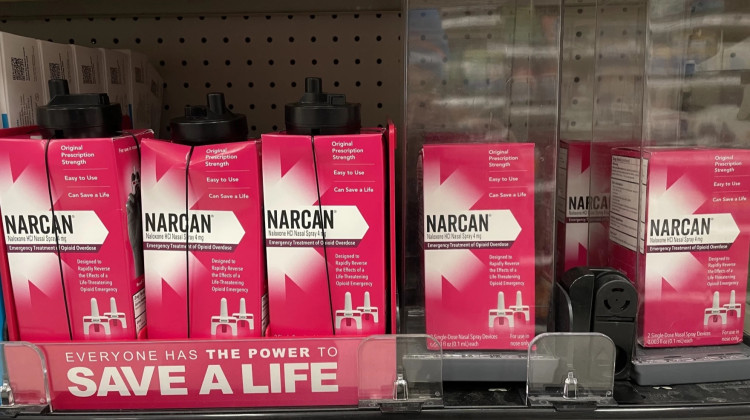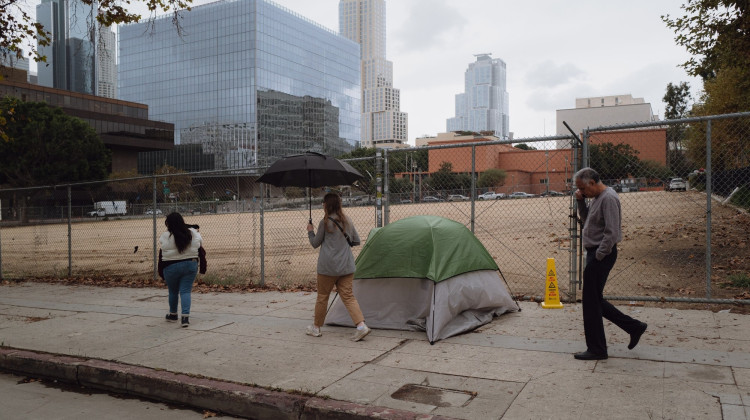
Sam McHenry packs bags at the Damien Center food pantry in Indianapolis. (Jill Sheridan/IPB News)
The federal government announced a push last year to end the HIV epidemic. The virus, which was once a death sentence for many, can now be managed and prevented through medical advances, but it will take more than a pill to stop the spread of HIV.
A one stop shop model aims to help close the gaps in care for Hoosiers.
Sam McHenry has been a volunteer at the Damien Center in Indianapolis for more than 20 years.
"We we do a strong emphasis on the protein, beans and then the frozen meats," says McHenry.
It’s important to get enough protein, especially if you’re HIV positive. McHenry likely contracted the human immunodeficiency virus in the mid '80s but didn’t find out until 1992.
"My infectious disease doctor told me I would live possibly a year to year and a half at most," says McHenry. "I'm very stubborn."
McHenry says he lost his eyesight to complications from HIV but he’s still able to live a healthy, productive life.
The Damien Center has helped.
"Care Coordination was very helpful in providing me with support or support groups and things of that nature," says McHenry.
For McHenry that coordination of support was key. Others face different challenges, a lost job, eviction or mistrust of the healthcare system.
The Damien Center makes its home in an old brick building that was once an Indianapolis school. Every inch of the space is utilized.
"We try to be a one stop shop," says Alan Witchey. "We offer everything from direct medical care to housing, transportation, food, case management, mental health care, psychiatric care, substance use treatment, all under one roof."
Witchey is president and CEO of the Damien Center. He says having all those social services in a single space improves the chances that people will receive care, no matter what the barrier.
One barrier is simply finding out your status. Witchey says Damien offers free HIV testing to anyone, it only takes a few minutes to get the results.
"You would think that would make it so much easier to know everyone's status in the city," says Witchey. "But what we do know is there are at least probably about 1000 people in this city that are HIV positive who don't know it."
Indiana has about 500 new cases of HIV every year and most new transmissions are from people who don’t know they have the virus. Witchey says a lot of that is because people simply don’t know the facts.
"They’re still afraid of it," says Witchey, "There's a lot of myths that people still think they might die they might get very sick from their medications. They might not ever be able to live a normal life span and all those things are not true anymore."
People who are HIV positive can take medication that can effectively reduce the amount of virus in their blood to non-detectable. There’s also preventive medication called PrEP that protects from HIV.
The Damien Center helps people get on the proper drugs. But that’s just one piece of the puzzle to end the epidemic.
Tyne Parlett is the housing program manager at Damien Center and says many clients have more basic needs and the center is able to provide for those, and more.
"So that we aren't just turning people away after having a blood draw; or getting them on PrEP and being able to insure them for one medication, but sending them somewhere else; or being able to house them but not being able to get them a bed," says Parlett.
Health and Human Services Secretary Alex Azar made a trip to the Damien Center recently to check out their wrap-around model of care. Indianapolis was named as one of 48 hotspots that will receive federal support to address HIV services.
Parlett says while Damien offers education and support, it can’t end the stigma that impacts many clients.
"The social implications that come from an HIV diagnosis are more than just an HIV diagnosis," says Parlett, "So we're talking about your social support now being gone. We're talking about maybe housing now being something that you can't secure. We're talking about literal criminalization for some of our trans-sex workers that are out there."
Sam McHenry, the Damien Center volunteer, says to end the epidemic, it will take more – more education, more awareness, more understanding.
"It's living healthy and it’s living strong," says McHenry.
The federal push to end the epidemic aims to reduce new cases by 75 percent in five years.
More than 12,000 people in Indiana are living with HIV.
Contact Jill at jsheridan@wfyi.org or follow her on Twitter at @JillASheridan.
 DONATE
DONATE







 Support WFYI. We can't do it without you.
Support WFYI. We can't do it without you.